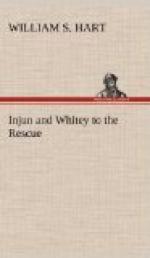Whitey choked back a sob with which the silence would have been broken. He felt something warm and moist on his hand, and looked down. It was the tongue of Sitting Bull, the faithful—forgotten but not forgetting. And as Whitey gazed at the friendly ugly face of the dog, he noted the determination marked in every feature of it. He could not imagine any one’s stopping Bull from going into a fight if he wanted to go into it. And perhaps unconsciously Whitey’s under lip and jaw shot out, and his face took on much the expression of Bull’s. Whitey would like to see any one stop him from going.
That new, elderly cook not only approved of Whitey’s purpose of disobedience or rebellion, he aided him in it; yes, if it cost him his job! There was the iron-gray colt, still restless and as ready for the fourteen-mile ride back as he was for his breakfast. While Whitey limped into the ranch house for some clothing and footwear, the cook had his own troubles getting his own saddle and bridle on that pony.
When Whitey reappeared and was helped into the saddle, he let out a yell of agony and helped himself out again. This would never do. The leather felt like hot iron. A consultation. The cook’s blankets were brought out, folded and cinched on the saddle, the stirrups shortened. Again Whitey mounted. The torture was somewhat less. Painfully he galloped away. A last look back showed the lantern on the ground, the cook kneeling beside it, with both arms around Sitting Bull, restraining that warrior from following.
When the Bar O men and Lampson and Cooley were joined by the contingent from the Junction, about forty determined vigilantes dashed over the prairie. Their horses were fresh and they made good speed. The cloudy darkness had given way to starlight that dimly illumined the still night. Mr. Sherwood had aimed at a sufficient force to overawe the threshers, if possible. There was little talk.
They had made perhaps ten miles when there was a distraction. A horse came galloping toward them. A dozen rifles were drawn from their gunboats. When the horse drew near, it made a detour, avoiding them, and eyes accustomed to the darkness could see that it was riderless. With no pause, but commenting on this, they rode on.
About two miles farther on, from the surface of the plain came a flash of flame and the short bark of a forty-five, followed by another and another. The men reined in, but the shots were directed the other way. The marksman was evidently too occupied with his invisible target to notice them. But on their nearer approach he rose to his feet and started to run. A shot over his head, a sharp command, and he halted and was surrounded by the vigilantes, but not before he had slily dropped some object in the grass. One of the men dismounted and struck a match.
“Why, it’s Henry Dorgan!” exclaimed Mart Cooley.
Dorgan appeared to be greatly flustered and in pain. His left arm was helpless from a wound in the shoulder, and from the fleshy part of it an arrow protruded. It probably had been less painful to leave it there than to pull it out. It was a home-made arrow.




